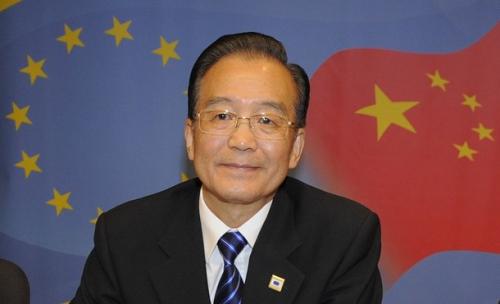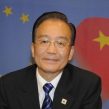
Beijing Wages Economic Diplomacy to Counter “China Threat” Theory
Publication: China Brief Volume: 10 Issue: 23

Beijing is waging an economics-focused diplomacy of reassurance to counter the “China Threat” theory and to augment its political clout particularly in the Asia-Pacific and European regions. In the last two years of its term of office, the Hu Jintao leadership is expected to use the country’s economic muscle to convince the global community that the quasi-superpower’s precipitous rise will bring about win-win scenarios particularly on the business and trade fronts. This is in view of foreign-policy setbacks that China has suffered in the past ten months due mainly to heightened territorial disputes with countries including Japan and India, as well as members of the Association of Southeast Asian Nations (ASEAN). Friction between China and its neighbors has apparently allowed the Barack Obama administration, which has reiterated America’s desire to “come back to Asia,” to make new headway in what Beijing perceives as an “anti-China containment policy.”
In the past month or so, senior Chinese diplomats and commentators have cited a new foreign-policy dictum coined by President Hu, who heads the Chinese Communist Party’s (CCP) policy-setting Leading Group on Foreign Affairs. The instruction – “insist upon hiding one’s capacities and biding one’s time; enthusiastically seek [concrete] achievements” – is an amplification of the eight-character mantra laid down by late patriarch Deng Xiaoping in the early 1990s: taoguangyanghui, yousuozuowei (“Hide one’s capacities and bide one’s time; seek [concrete] achievements”). Hu’s motto was first unveiled in a closed-door conference of overseas-based diplomats held in Beijing in mid-2009 (Xinhua News Agency, August 14; China.com.cn, November 7).
By adding the qualifier “insist upon,” the Hu leadership wants to impress upon the global community—particularly China’s nervous neighbors—that China does not harbor expansionist tendencies despite the leaps-and-bounds growth in its economic and military might. By underscoring the fact that China should “enthusiastically” go after diplomatic achievements, Hu has given solid indications that the Middle Kingdom would be proactively pursuing objectives that befit the country’s elevated status. Yet, Beijing also took pains to point out that these ambitious goals are mostly economic in nature. As the official Outlook Weekly pointed out in a commentary last week, China is pursuing “economics-focused diplomacy” by ensuring that “political maneuvers will be in the service of economic goals” and vice versa (Outlook Weekly, November 7; People’s Daily, November 7; Xinhua News Agency, November 7). In light of the country’s $2.5 trillion foreign-exchange reserves, Beijing has an unprecedentedly large war chest to engage in economic diplomacy.
This shift in Chinese diplomacy is evidenced by the marathon overseas forays made by Politburo Standing Committee (PBSC) members after the plenary session of the CCP Central Committee last October, which settled the succession question by inducting Vice-President Xi Jinping into the Central Military Commission as vice chairman. The missions have included Hu’s trips earlier this month to France and Portugal, in addition to his attendance of the just-completed G20 Meeting in Seoul and the Asia-Pacific Economic Cooperation (APEC) forum in Yokohama, Japan. Also in the past fortnight, Chairman of the National People’s Congress (NPC), Wu Bangguo, visited Cambodia, Thailand and Indonesia, while his PBSC colleague, Chinese People’s Political Consultative Conference Chairman Jia Qinglin, toured Syria, Poland, Oman and Kazakhstan. Meanwhile, Vice-President Xi set off this week on a tour of Singapore, South Africa, Angola and Botswana (Ming Pao [Hong Kong], November 9; Xinhua News Agency, November 12).
Most eye-catching have been inroads that Beijing has made in Europe. For reasons including fostering a “multi-polar world order,” it has been a long-standing tradition for Beijing to bolster ties with the European Union when it is encountering hiccups in relations with the United States. Beijing seems to be reviving the old game of playing favorites, which is a time-honored tactic to help stymie the development of a transatlantic approach to China. Hu firmed up a “new-era comprehensive strategic partnership” with France in his three-day trip to the country, during which he met with counterpart Nicholas Sarkozy five times. The two leaders signed trade and investment deals worth $22.8 billion. Sarkozy, who two years ago was pilloried by Beijing for meeting the Dalai Lama, spoke glowingly of the PRC’s global contributions. “To resolve the big problems in the world we need China,” he said. “China should not be seen as a risk but an opportunity,” the French President added. “It’s not by reproaching people for things that you make progress” (People’s Daily, November 8; Reuters, November 5). Last week, China also played host to British Prime Minister David Cameron, who was making his first trip to Beijing with a record number of business executives. While the British signed deals worth a mere $1.6 billion, selected British financial institutions were given access to the China market ahead of their American competitors. While both Sarkozy and Cameron discreetly touched upon human rights in private talks with Chinese leaders, no strong public calls were made for Beijing to improve its treatment of dissidents, including the incarcerated Nobel Peace Prize laureate, Liu Xiaobo (BBC News, November 9; The Guardian [London], November 10; Financial Times, November 12).
While Portugal is not considered a heavyweight EU member, Hu’s trip to the country is emblematic of the quasi-superpower’s role in taking advantage of the situation and shoring up the recovery of European countries that are still reeling from the international financial crisis. “We are ready to back, through concrete measures, Portugal’s efforts to face the impact caused by the international financial crisis and broaden our economic and trade cooperation,” Hu said while meeting Portuguese Prime Minister José Sócrates. The two signed deals and contracts in infrastructure, renewable energy and tourism worth $1 billion. Sócrates, whose government was struggling with debts and weak exports, highlighted the two countries’ “excellent political ties” and vowed to give “priority” to bolstering a Portuguese-Chinese partnership (The Associated Press, November 7; Theportugalnews.com, November 3). Earlier, Beijing bought $600 million worth of government debts issued by Spain, another weak link in the Eurozone economy. While in Greece last month, Premier Wen Jiabao pledged to purchase substantial amounts of the financially beleaguered country’s bonds in addition to setting up a $5 billion fund to help Greek shipping companies buy made-in-China vessels (Balkans.com, November 8; Ming Pao, November 7).
Beijing has also used economics-based diplomacy to try to steal the thunder of President Obama’s just-ended Asian expedition, which is interpreted by Chinese commentators as an effort to expand Washington’s “encirclement policy” against China (Global Times, November 8; Ming Pao, November 12). For example, NPC Chief Wu Bangguo toured Jakarta just prior to Obama’s historic visit to Indonesia, where he spent four years of his childhood. While the U.S. President made headlines with rhetoric such as “prosperity without freedom is just another form of poverty,” Wu seemed to be able to offer Indonesians something more tangible. The top parliamentarian pledged to invest $6.6 billion in much-needed infrastructure projects in the relatively poor Asian nation. Chinese Vice-Foreign Minister Zhang Zijun pointed out that his country had “long experience in infrastructure development, and now we have the budget as well as the technology.” China’s trade with the largest ASEAN member this year is worth an estimated $22.5 billion, compared to America’s $15.6 billion (Financial Times, November 10; Jakarta Globe, November 8). Given China’s still-festering border problems with India, it would be hard put for Beijing to prevent Obama from consolidating America’s newly minted strategic partnership with India during his 68-hour stay in the world’s most populous democratic country. Yet Premier Wen is due to call on New Delhi next month, when the Chinese leader is expected to stress growing trade and investment links between the two Asian giants (Economic Times [New Delhi] November 13; Hindustan Times, November 11).
There is also evidence that the Hu leadership’s new-found diplomatic flexibility is being applied to Japan. Sino-Japanese ties dipped to the lowest level in recent memory after the captain of a Chinese fishing vessel was seized by Japanese coast guard close to the disputed Senkaku Islands (known in China as the Diaoyu Islands). While in Yokohama for the APEC forum, Hu squeezed in a 20-minute meeting with Japanese Prime Minister Naoto Kan. This was the first dialogue between the two countries’ leaders since the sovereignty row. The official Xinhua News Agency’s report of the Hu-Kan meeting made no mention of the territorial squabbles. It quoted Hu as putting emphasis on reviving the two neighbors’ “strategic relationship of mutual benefit.” “China and Japan being major partners in economic and trade cooperation, both sides should continue to deepen their mutually beneficial bilateral cooperation,” Hu said (Xinhua News Agency, November 13; Kyodo News Agency, November 13).
The Chinese leadership’s “economic-focused diplomacy” seems to have worked to some extent at the G20 and APEC meetings, when Hu and his aides were able to prevent Obama from targeting Beijing’s apparent undervaluation of the yuan (Renminbi). While the G20 communiqué urged members to “move toward more market-determined exchange rate systems and enhance exchange rate flexibility,” no specific country was singled out for criticism. While a host of countries including Japan, the U.S. and Germany had wanted the G20 forum to discuss China’s withholding its exports of rare earth, the issue was apparently left off the table due to behind-the-scenes maneuvers by the Chinese delegation (New York Times, October 22; China News Service, November 14; AFP November 12). The two forums provided Hu with a platform to highlight China’s contribution to global economic recovery. “We must adopt an attitude responsible to history and the future… [and] work in concert for strong, sustainable and balanced growth of the world economy,” Hu said at the Seoul conclave (Los Angeles Times, November 11; Xinhua News Agency, November 12; Asahi Shimbun [Tokyo], November 12).
Beijing’s determination to use new strategiesto mend fences with different countries has been indirectly reflected by various experts’ realistic assessment of recent contretemps in the country’s foreign policy. In a recent interview with the Chinese media, Renmin University international relations professor Shi Yinhong expressed disappointment with China’s diplomatic performance. “We can do with some soul-searching,” said Shi. “In many respects, China’s qualifications [for being a global actor] have improved, yet conditions on the diplomatic front have worsened.” Similarly, popular military commentator General Zhang Zhaozhong indicated that Beijing faces the most serious challenges in 30 years. “Countries like Japan, South Korea, and several Southeast nations suddenly turned their backs on China and followed the United States,” he wrote. “This is a very serious matter” (Wen Wei Po [Hong Kong] October 24; Nanfengchang Magazine [Guangzhou], October 22; People’s Daily website, November 1).
Doubts, however, linger as to whether the CCP leadership is indeed willing to turn a new page in its foreign relations. Beijing’s obdurate stance on the Liu Xiaobo issue is a case in point. Chinese diplomats have the past fortnight put pressure on numerous European and Asian countries not to send their emissaries to the award-presentation ceremony in Oslo next month. Earlier, Beijing had indefinitely shelved meetings with Norwegian officials on bilateral issues including the establishment of a China-Norway Free Trade Area (AFP, November 5; Straits Times, November 9; The Telegraph [London] October 11). Such apparent bullying is a continuation of the much-criticized hardball tactics that Beijing employed to intimidate the Nobel Peace Prize Committee into denying Liu the honor. Until the world sees more concrete evidence of Beiing’s readiness to “hide its capacities” and keep a low profile, yuan diplomacy alone may not be sufficient to showcase China’s status as a responsible stakeholder in the global community.





